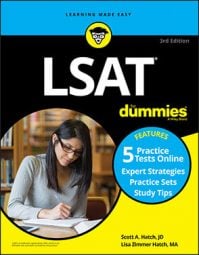Helping students prepare for the LSAT has become a multimillion-dollar (at least) industry. Test-prep companies promise huge score increases; students spend thousands on semester-long courses and tutors. Every major bookstore is full of books to help prospective lawyers on their way.
Be wary of expensive classes or snake oil salesmen that promise to reveal secrets or give you huge score increases. Usually, all that most people need is a good LSAT prep book and a few recent LSAT tests to do their best on test day. Save your money for law school! But be warned: Many folks lack the motivation and discipline for self-study.
If this describes you, buckle down and sign a contract with yourself, form a study group, or consider enrolling in a reasonably priced test prep course.
What really helps
What really helps you succeed at the LSAT is exposure to the test. Exposure may mean something as simple as taking one or two sample tests the days before you take the official one. More often, though, it may mean several weeks — or even months — of practice.
If you need extra prep materials, you can’t do better than the old LSATs sold by the LSAC; they’re called PrepTests, and they’re the actual LSATs that have been administered to willing victims over the last decade. Be warned, though; the LSAT has increased in difficulty and changed slightly in format over the years, so you’ll get your most valuable practice from the most recent tests.
Practice makes perfect
Any book you consult will recommend that you prepare for the LSAT by taking practice tests under simulated test-day conditions. That means sitting down on a Saturday morning (or some other day when you have three or four hours unscheduled) with a test booklet, an answer sheet, a No. 2 pencil, and a timer, and working your way through the test, section by section, stopping work when the timer buzzes.
Taking a timed, full-length practice test is ideal, but if you’re unable to carve out three or four hours to do so, don’t despair. Your valuable study time may be better spent working through questions slowly and carefully, making sure that you really know how to work the analytical reasoning problems and analyze the logical reasoning questions. Then take timed practice sections to hone your time-management skills.
However you decide to practice, just be sure you give yourself enough time. Try to start at least a couple of weeks before the test date. The more exposure you have to test questions, the more comfortable you’ll be on exam day.

